La reimposta della password di WordPress è di solito un processo semplice. Tuttavia, a volte i metodi standard non funzionano, lasciandovi bloccati fuori dal vostro sito web.
Alcuni dei nostri lettori hanno riscontrato questo problema e ci hanno chiesto un consiglio su quale sia il modo migliore per accedere ai loro account. Fortunatamente, potete sempre utilizzare lo strumento phpMyAdmin nel pannello di controllo del vostro account di hosting per reimpostare la password direttamente dal database di WordPress.
In questo articolo vi mostreremo come reimpostare facilmente la password di WordPress da phpMyAdmin. Spiegheremo ogni passaggio in modo chiaro, assicurandoci che anche chi non ha familiarità con i database possa seguirlo con sicurezza.
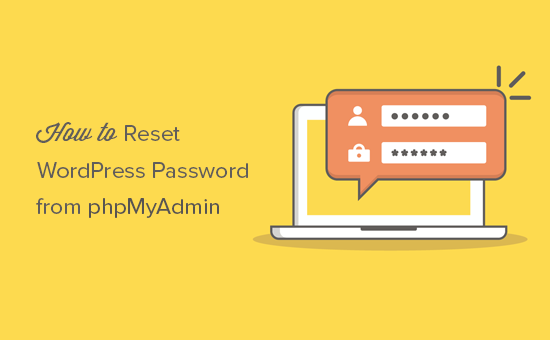
Perché resettare la password di WordPress da phpMyAdmin?
WordPress rende super facile il recupero di una password persa.
È sufficiente andare alla schermata di accesso del vostro sito web WordPress e cliccare sul link “Hai perso la password?”.
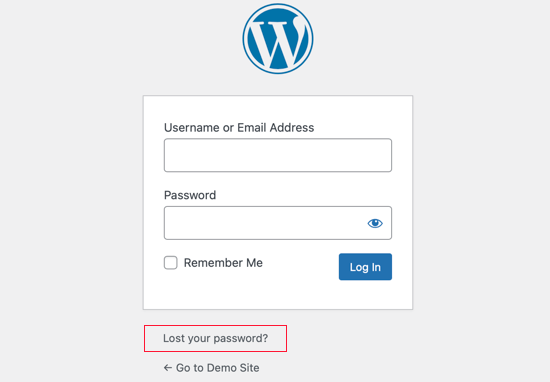
Facendo clic sul link si accede alla pagina di reimpostazione della password. Una volta inserito il nome utente o l’indirizzo e-mail, WordPress invierà un link per la reimpostazione della password all’indirizzo e-mail associato.
Tuttavia, se non avete accesso a quell’indirizzo e-mail o se il vostro sito WordPress non riesce a inviare un’e-mail, non sarete in grado di reimpostare la password.
In questa situazione, è necessario reimpostare la password di WordPress direttamente nel database. Il modo più semplice per farlo è usare phpMyAdmin.
Detto questo, vediamo come resettare facilmente una password di WordPress da phpMyAdmin.
Come resettare la password di WordPress da phpMyAdmin
Se non volete guardare il tutorial video, potete continuare a leggere la versione testuale qui sotto.
Per prima cosa, è necessario accedere al cruscotto cPanel del vostro account di hosting WordPress. Quindi, è necessario navigare nella sezione Database, dove è possibile fare clic sull’icona phpMyAdmin.
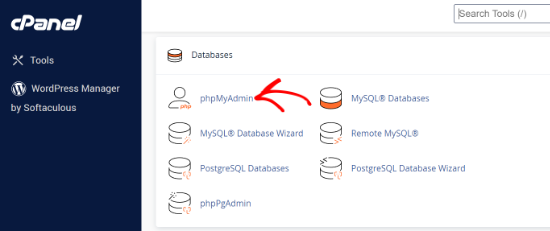
In questo modo si avvia l’applicazione phpMyAdmin.
Qui è necessario selezionare il database di WordPress dal riquadro di sinistra.
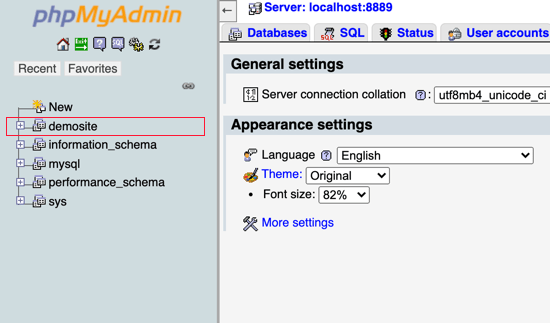
Ora viene visualizzato l’elenco delle tabelle del database di WordPress.
È necessario cercare la tabella wp_users in questo elenco e fare clic sul link “Sfoglia” accanto ad essa.
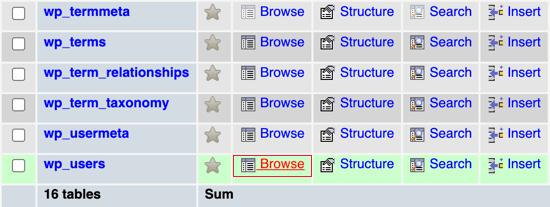
Nota: i nomi delle tabelle nel database di WordPress potrebbero avere un prefisso diverso da quello mostrato nell’immagine. La modifica dei prefissi delle tabelle può migliorare la sicurezza del vostro sito WordPress.
Ora si vedranno le righe della tabella degli utenti di WordPress. Fate clic sul pulsante di modifica accanto al nome utente di cui desiderate cambiare la password.
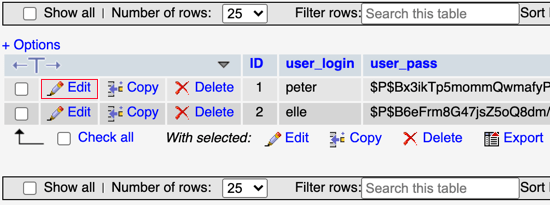
PhpMyAdmin mostrerà un modulo con tutti i campi delle informazioni dell’utente.
È necessario cancellare il valore del campo user_pass e sostituirlo con la nuova password. Nella colonna Funzione, selezionare MD5 dal menu a discesa e fare clic sul pulsante Vai in fondo al modulo.
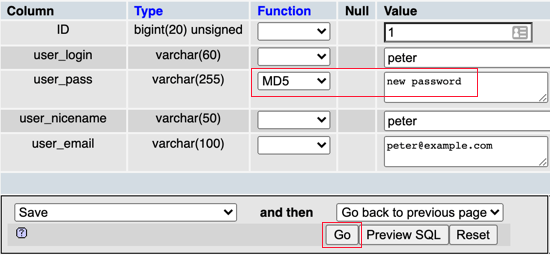
La password verrà crittografata utilizzando l’hash MD5 e poi verrà memorizzata nel database.
Congratulazioni! Avete cambiato con successo la password di WordPress usando phpMyAdmin.
Alcuni di voi si chiederanno perché abbiamo scelto l’hash MD5 per criptare la password. In precedenza WordPress utilizzava l’hash MD5 per crittografare le password, ma da WordPress 2.5 utilizza tecnologie di crittografia più forti.
Tuttavia, WordPress riconosce ancora l’MD5 per garantire la compatibilità con il passato. Non appena si accede utilizzando una stringa di password memorizzata come hash MD5, WordPress la modificherà automaticamente per utilizzare gli algoritmi di crittografia più recenti.
Guide di esperti sulle password in WordPress
Ora che sapete come reimpostare una password di WordPress da phpMyAdmin, potreste voler vedere altri articoli relativi alle password di WordPress.
- Come cambiare la password in WordPress (Guida per principianti)
- Come resettare le password di tutti gli utenti in WordPress
- Come personalizzare la pagina di reimpostazione della password di WordPress
- Come forzare gli utenti a cambiare la password in WordPress – Scadenza della password
- Password dimenticata? Come recuperare una password persa in WordPress
- Come forzare le password forti agli utenti in WordPress
- Come aggiungere l’autenticazione a due fattori in WordPress (metodo gratuito)
- Come consentire agli utenti di nascondere/mostrare le password nella schermata di accesso di WordPress
- Come gestire le password in modo facile e sicuro (Guida per principianti)
Speriamo che questo tutorial vi abbia aiutato a imparare come resettare una password di WordPress da phpMyAdmin. Potreste anche voler consultare la nostra guida definitiva alla sicurezza di WordPress, passo dopo passo, per mantenere il vostro sito WordPress al sicuro, oppure la nostra selezione di plugin indispensabili.
Se questo articolo vi è piaciuto, iscrivetevi al nostro canale YouTube per le esercitazioni video su WordPress. Potete trovarci anche su Twitter e Facebook.





Bowen
Hello,
Added Https to all pages, says unsafe, attempt to login and no luck, hit forgot password system reverts to Mojo Page…changed password per instructions above still no luck…any ideas how to get https off wordpress?
Tess
OK, I have followed these instructions and successfully changed my admin password in the database and I still get a failed login message when I login with it. I need help gaining access to my site, please.
Sandra
Thank you so much! These instructions helped me reset my WP username and password
neotanvir
How can I transfer MD5 to normal text
Patty Ayers
Thank you! Worked like a charm.
Edwin Schichter
Very simpel…. just change and save the users emailadress into something familiar in the database, click on forgot password in the wordpress login page
Patty Ayers
Yes, but only if you already have access to the back end.
Andrew
Awesome thanks so much for taking the time to write this just recovered by site in 60 seconds – as a newbie rely on help online :)))
Yana
Thanks mate, you made my day =)
Kinfe Weldu
thank you.this solved my problem.
sarah
thanks very helpful
Toyin
Thanks for this article.Simple guide,was able to change my password through myphp.
harish chand
Great thanks
MITESH MISTRI
Hey… Nice post and this idea really works. Thanks.
Adeel Ahmed
Thanks a lot. I had the problem but it has been solved . Otherwise I felt miserable about my wordpress login password being stolen
Jedediah
Odd, I did this correctly and it’s still not letting me in.
venukanth
really thanke ..most use full
Hasan
Thanks, it’s really helpful and great !!
Razzaq
another simple method for get the password, after edit the record change the email address. On wp-admin login screen, click on forget password. You will get the new link of make a new password.
Harsh
Thanks a lot friend, very helpful post
Asaf Fialkov
Many thanks! Worked like a charm
Mike
Fantastic, you are geniuses!
Ken
Thanks Man, your a lifesaver
Dave
Perfect. Thanks for posting.
VaLAngel
Great, great, great! 1 Billion Thanks…
Clinton
Thank you!
Al
Thanks buddy, i used to do lots of stuff on my wordress blog few years ago but now i kind of forget how to do it. Your blog post refreshed my memory…thanks again
Jarrii
Thank you so much It works perfectly
It works perfectly 
Hilda
worked perfectly, thank you so much!
Dan
Followed your very clear steps. Worked like a charm. THANK YOU!
Rose
Thank you so much! I couldn’t get into my new install of Word Press and of course it is the weekend. This is so well written that I was able to reset the admin password in one try.
Ewan
How is this discussion affected by the salts in the wp-config file? Do we need to combine those when creating a new password?
Marty
Over the last few weeks, I’ve had the pleasure of dealing with clients that didn’t have a reputable developer/designer and left them high and dry with little to no access of their OWN site, noway of re-setting the password through the recovery email, this guide WOULD have been great 2 weeks ago, but I’m sure I’ll be using it in the near future…
cheers Syed..
Karl Craig-West
Perfect, worked a treat.
Many thanks indeed.
Harpa
Thank you so much
Dotty
Thanks so much – this really helped.
Luis
What a lifesaver post! Thanks!
Ton
Thank you so very much!
Andrea
ok, I have done step by step everything you have suggested and is not working……..what can I do?
Editorial Staff
Theoretically, if you did everything mentioned in this article, then it should work. However, you can always try this tutorial where you add a new admin user.
https://www.wpbeginner.com/wp-tutorials/how-to-add-an-admin-user-to-the-wordpress-database-via-mysql/
Admin
Marty
You can lead a horse to water………..but…..!…..
BK
This was a life save. thanks
vking
thanks you man it’s work!
it’s work!
Muhammad Abdul Qadoos
why not we change email address and ask wp to resend password reset email
we change email address and ask wp to resend password reset email 
Editorial Staff
You can do that as well. Then go click on reset button. Wait for the email to come. Then reset your password. Seems like a bit longer process, but to each their own.
Admin
subbareddy
this helps very much when you are in local system . Password reset doesnt work some times in local server .
I helped me a lot today
Benjamin
Some hosts have the mail() function turned off and are unable to send emails via php.
stevelockridge
Fabulous!!! Thank you!!! My client contacted me because their previous designer vanished and left them with NO login information for ANYTHING. This saved us all a lot of headaches.
rradvani
great saved me !!! thanks wpbeginner!!
!!! thanks wpbeginner!!
sharphue
See that user_email field in the screenshot above? Just change the value to an e-mail address that you have access to. On the WP-Admin login screen, click “lost your password?” and type in the same e-mail address and you will receive a reset password link that will be easier than messing with MD5 hashing.
Oluniyi D. Ajao
Thank you very much. You saved me having to re-install a WordPress installation.
W^L+
There has been some talk about web applications moving to a hash of the password + another string, to make it harder for bad guys to get in. Do you think this is coming to WP soon? (I think Joomla and Drupal are already doing this.)
Editorial Staff
WordPress already has that built-in. You just have to add your own security keys in your wp-config.php file. Open it and you will see the place for it and a link where you can get your security keys from.
Admin
Jeff
Under the functions column, if you choose MD5, MySQl will automatically encrypt your password in MD5. Simply type your plaintext password in the main box.
This is a little easier than using other sites.
kusanagi
very helpful, thanks.
Utkarsh
You can also enter the password in plain text, and select MD5 from the function dropdown. It’ll automatically save the MD5 hash of the password in the database.
Jaspal
Thnx .. that’s a great tip .. it will be very helpful for me